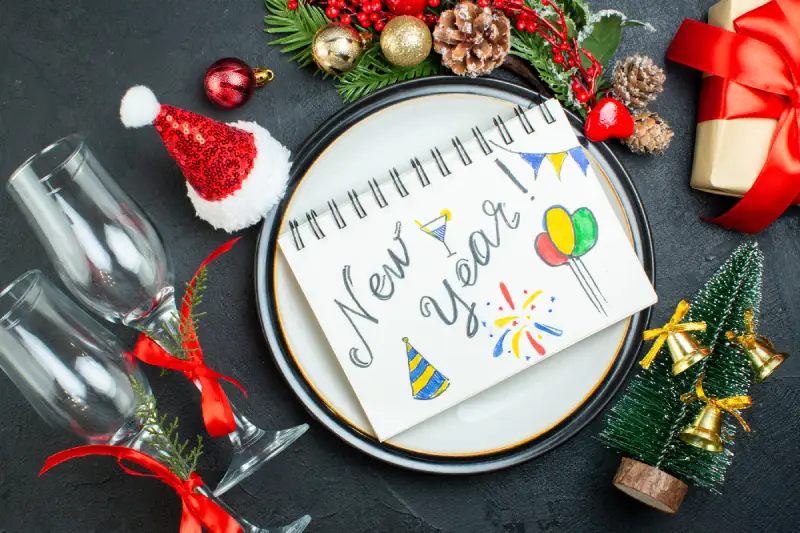As the New Year approaches, people worldwide engage in various traditions and rituals to invite good luck, prosperity, and happiness into their lives. Many of these customs are rooted in cultural beliefs and superstitions passed down through generations. From symbolic foods to thoughtful actions, these practices are believed to set the tone for the year ahead, offering a fresh start filled with positive energy.
Whether eating 12 grapes at midnight, ensuring your wallet isn’t empty, or avoiding tasks like cleaning and sweeping, these rituals vary widely but share a common goal: attracting good fortune. Some involve symbolic gestures, like opening doors to let in the new year, while others focus on banishing negativity, such as making noise to ward off evil spirits.
These superstitions add a festive touch to New Year celebrations and offer a sense of hope and control as people step into the unknown. Regardless of whether you believe in their magical effects, participating in these traditions can be a fun and meaningful way to mark the occasion. Read on to discover 10 popular New Year’s superstitions that might bring you a little extra luck as you welcome the year ahead!
1. Eat Black-Eyed Peas and Greens

Eating black-eyed peas and greens is a time-honored New Year’s tradition, particularly in the Southern United States. This custom is deeply rooted in history and symbolism, with black-eyed peas representing good luck and prosperity. The tradition originates from West African and Southern American cultures, where legumes signify wealth and fertility. Eating black-eyed peas on New Year’s Day is believed to bring blessings and good fortune for the year ahead.
Collard greens, often served alongside black-eyed peas, hold special significance. Due to their green, dollar-like appearance, the greens symbolize money and wealth. Some people even add cornbread to the meal, representing gold, to complete the trio of financial success symbols. These dishes are a hearty and delicious way to celebrate the new year and a meaningful ritual to manifest abundance.
This tradition became more widespread during and after the Civil War, when Union soldiers raided Southern food supplies but left black-eyed peas and greens, considering them animal feed. For many Southerners, these humble foods symbolized resilience and survival, transforming into a celebratory dish to honor hope and prosperity as a new year begins.
2. Avoid Cleaning or Sweeping

Avoiding cleaning or sweeping on New Year’s Day is a superstition rooted in the belief that these actions can “sweep away” or “wash out” your good luck for the upcoming year. Many cultures emphasize starting the year with an abundance of positivity, and performing housework on this day is seen as symbolically discarding fortune, wealth, or happiness. This belief encourages people to prepare their homes before New Year’s Day, ensuring a clean slate without compromising their luck.
The superstition also reflects the importance of preserving prosperity. Cleaning, wildly sweeping, is often equated with removing something significant from your home. On a symbolic level, this act may represent inadvertently pushing away opportunities, blessings, or good fortune waiting to settle in during the year. This is why many people complete household chores and deep cleaning in the days leading up to New Year’s Eve.
Additionally, this tradition can be a practical reminder to relax and enjoy the holiday with loved ones. Instead of worrying about tidying up, New Year’s Day becomes an opportunity to focus on personal goals, quality time, and setting intentions for the future. Whether you follow it for superstition or as a cultural tradition, avoiding chores on January 1st can add meaning to your celebration.
3. Wear Polka Dots or Circles

Wearing polka dots or clothing with circular patterns on New Year’s Eve is a superstition rooted in the symbolism of circles representing coins and wealth. This belief is prevalent in countries like the Philippines, where people embrace the idea that incorporating circular shapes into their attire can attract financial prosperity and abundance for the year ahead. Polka dots symbolize unending fortune due to their continuous, closed-loop shape, making them a festive and fashionable choice for ringing in the New Year.
Many people go beyond their outfits to fully embrace this tradition, incorporating circular motifs into their celebrations. Round accessories like jewelry, buttons, or even coin-shaped decorations are popular additions. Some take it further by placing round fruits, such as oranges and grapes, on their dining tables, believing that surrounding themselves with circular objects strengthens the promise of wealth and prosperity.
This superstition also ties into the broader theme of starting the year with abundance and positivity. Even if one doesn’t strictly believe in its luck-attracting power, wearing polka dots adds a playful, celebratory flair to the festivities. Whether for tradition, fashion, or fun, this custom serves as a joyful reminder to look forward to a year of prosperity and fulfillment.
4. Make Noise at Midnight

Making noise at midnight on New Year’s Eve is a long-standing tradition in many cultures worldwide. This custom is rooted in the belief that loud sounds scare away evil spirits and negative energies, ensuring a fresh and positive start to the year. In ancient times, people used drums, bells, and even shouting to drive away evil forces lurking around the transition from one year to the next.
Today, this tradition has evolved into a celebratory ritual. Fireworks, party horns, clanging pots and pans, and even music are used to ring in the New Year with energy and enthusiasm. Beyond its symbolic significance, the noise represents joy, togetherness, and the anticipation of new beginnings. In large gatherings, the crescendo of sounds at midnight unites people in a shared moment of jubilation.
While its origins are steeped in superstition, making noise also has a psychological effect, creating a sense of excitement and release. It’s a way to shake off the past year’s worries and embrace future opportunities with open arms. Whether you believe in its protective powers or not, making noise at midnight is a fun, energetic way to welcome the New Year with optimism and celebration.
5. Open Your Doors and Windows

Opening doors and windows on New Year’s Eve or Day is a symbolic tradition. It represents a fresh start and new opportunities. The act signifies letting go of the old year, with all its challenges and negativity, while inviting in the promises of the new one. Many believe this simple gesture creates a pathway for good luck, fresh energy, and positivity to flow into your home and life.
In some cultures, it is customary to open doors and windows at the stroke of midnight, allowing the “spirit” of the old year to leave and make space for new blessings. This practice reflects the universal desire to begin the year on a clean slate, embracing change and renewal. It also aligns with closing chapters and welcoming fresh beginnings, making it a symbolic yet practical tradition.
While rooted in superstition, this ritual also carries an emotional and psychological benefit. The act of physically opening your home to the fresh air and newness of the year can be uplifting and empowering. It serves as a reminder to release what no longer serves you and to embrace the unknown with hope and enthusiasm, creating a warm and inviting atmosphere for the year ahead.
6. Eat 12 Grapes

Eating 12 grapes at midnight is a cherished New Year’s superstition in Spain and many Latin American countries. Known as “Las Doce Uvas de la Suerte” (The Twelve Grapes of Luck), it involves eating one grape for each clock chime as it strikes midnight. Each grape represents one month of the year, and the ritual is believed to ensure good fortune, health, and prosperity for the upcoming year. Timing is critical, as participants must finish all 12 grapes before the final bell tolls to maximize their chances of a lucky year.
This custom traces its roots to Spain in the late 19th century, when a surplus of grapes in the Alicante region inspired winemakers to promote the practice as a festive way to consume the extra fruit. Over time, it became a widespread tradition, blending elements of superstition with community celebration. Families and friends often gather to eat their grapes together, sharing laughter and setting intentions for the new year.
Beyond its symbolic meaning, eating 12 grapes is also seen as a test of agility and determination, adding a playful element to the celebrations. Whether or not you believe in its power, it’s a fun and delicious way to welcome the New Year.
7. Pay Off Debts

Starting the New Year debt-free is a popular superstition tied to financial prosperity and stability. The belief is that carrying unpaid debts into the new year sets a negative tone for your finances, symbolizing continued financial struggles. By settling outstanding debts before December 31, you clear your slate and invite fresh opportunities for abundance and financial growth. This practice encourages careful financial planning and reflects the desire to avoid money-related stress in the year ahead.
Beyond its symbolic significance, paying off debts before the New Year can have practical benefits. It fosters a sense of accomplishment and financial responsibility, boosting confidence as you face the coming months. Starting the year without the burden of looming repayments allows you to focus on saving, investing, or achieving other financial goals. This tradition also encourages prioritizing financial well-being, which can positively influence your mindset and habits throughout the year.
While it may not always be possible to clear every debt, even small efforts—such as paying off a credit card balance or clearing overdue bills—can align with this tradition. It’s less about achieving perfection and more about starting the year on a positive financial note, symbolizing growth, balance, and the intention to manage your resources wisely.
8. Keep Cash in Your Pocket

The superstition of keeping cash in your pocket on New Year’s Day is a symbolic gesture rooted in the belief that starting the year with money at hand invites financial prosperity and abundance. It serves as a physical reminder to focus on attracting wealth and stability in the year ahead. Many believe that an empty wallet or purse on New Year’s Day could set a precedent for financial struggles in the coming months, so even a tiny amount of cash is thought to make a positive difference.
This tradition is practiced in various cultures worldwide, often with slight variations. Some people go beyond carrying cash and ensure their wallets are full of bills and coins to maximize the effect. Others make it a point to avoid borrowing or lending on New Year’s Day, as it is thought that starting the year in debt could lead to financial challenges.
Carrying cash on this auspicious day is not just about superstition—it also promotes a mindset of abundance and gratitude. By focusing on financial well-being, individuals may feel inspired to make intelligent financial decisions, such as saving more or budgeting wisely, setting a prosperous tone for the months ahead.
9. Avoid Crying or Arguing

The superstition of avoiding crying or arguing on New Year’s Day is rooted in the belief that how you start the year sets the tone for the months ahead. Negative emotions like sadness or anger invite misfortune and unhappiness throughout the year. As a result, many cultures advise maintaining a positive attitude and focusing on joyful activities to ensure the year will be filled with peace and harmony.
In addition, the tradition emphasizes the power of emotional energy. If you begin the year with positive interactions and cheerful moments, you are believed to carry that energy into the future. On the other hand, disputes or tears can be seen as a sign of the challenges to come, potentially influencing the entire year’s events. People try to stay calm and focused on creating happy memories to avoid bad luck.
This superstition encourages people to be mindful of their emotional well-being, not just on New Year’s Day but throughout the year. Promoting peace and happiness at the start of a new year reminds us that our mindset can have a powerful impact on the journey ahead. It’s an invitation to approach the year with optimism and a heart full of hope.
10. First-Footing Tradition

The First-Footing tradition is a well-loved custom in Scotland, other parts of the UK, and some European countries. It is centered around the first person to enter a home after midnight on New Year’s Eve, known as the “first footer.” This person is believed to bring luck for the year ahead, with the idea that the energy they carry into the house will influence the family’s fortune. Traditionally, it is considered most auspicious for the first footer to be a dark-haired male, as it was once believed that a fair-haired person might bring bad luck.
The first footer often carries symbolic gifts to ensure further prosperity, such as coal (for warmth and comfort), bread (for food and sustenance), whisky (for good cheer), or salt (for flavor and preservation). These gifts represent various forms of wealth and well-being that are hoped to flow into the home over the coming year. The first-footer’s arrival is celebrated with excitement and warmth as the family gathers to welcome the symbolic “good fortune.”
Though the exact origins of first-footing are unclear, it is thought to have roots in ancient Celtic traditions. Over time, the practice evolved into a New Year’s custom, with a strong emphasis on ensuring a year full of blessings. Today, it remains a cherished tradition in many places, bringing friends and family together to start the new year on a lucky and festive note.
Conclusion
New Year’s superstitions are a fun and meaningful way to welcome the upcoming year with optimism and hope. Whether eating symbolic foods, making noise to ward off evil spirits, or following traditions like first footing, these customs reflect a desire for luck, wealth, and happiness. While they vary across cultures, they all share a common theme: starting the year with positivity and good intentions can set the stage for a prosperous future. Embracing these practices can bring joy and good fortune, turning the New Year into a fresh and exciting chapter.








